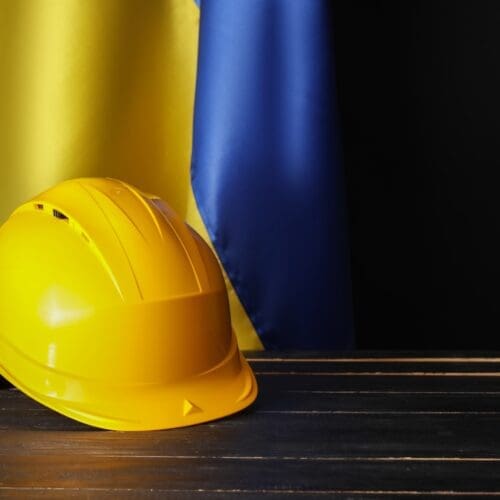Rebuilding Ukraine Part 3: Procurement
June 2023EU support for Ukrainian projects
The EU and its member states, along with European financial institutions, are providing up to €50 billion in financial, humanitarian, emergency, budget, and military support to boost Ukraine’s ongoing resilience against Russia’s war of aggression. It goes without saying that a major global financial effort will be required to rebuild Ukraine once the war is over.
The EU has launched the Multi-agency Donor Coordination Platform to support Ukraine’s repair, recovery and reconstruction process. The European Commission and Germany co-hosted the International Expert Conference on the Recovery, Reconstruction and Modernisation of Ukraine in Berlin to demonstrate their support for Ukraine and to ensure that reconstruction efforts are inclusive and part of its path towards EU accession. President of the Commission Ursula von der Leyen stressed that the recovery efforts need to be an inclusive multi-stakeholder process.
European Investment Bank
Our research reveals that the European Investment Bank has been a significant funder of projects in Ukraine both before and during hostilities.
During the war, the EIB approved a first package of €668 million to assist the government in meeting urgent needs. A second package of €1.59 billion was then approved in July 2022 to repair damaged infrastructure and resume crucial projects. Roads, bridges, and railroads that were destroyed have already received more than €1 billion in funding from the second package. The EIB Institute also contributed €2.5 million in humanitarian aid, and €59 million in grants were redirected to Ukraine in order to help with housing, transportation, and healthcare. Additionally, an agreement with Ukraine was inked in November, recognising the urgent need for more than €450 million to modernise the city’s transport system.
Part of the funding has been provided through the existing Ukraine Municipal Infrastructure Program and the Eastern Partnership Technical Assistance Trust Fund (EPTATF). Priority areas include private sector development, social and economic infrastructure development and climate change mitigation and adaptation.
Click here for a table that summarises details of construction projects funded in Ukraine by the EIB since February 2022.
Phoenix project
The European Commission has launched a call for proposals for three projects under the Phoenix initiative, which is financed by the LIFE Programme. The initiative aims to develop cutting-edge expertise in affordable and sustainable reconstruction for Ukrainian cities, using the New European Bauhaus (NEB) community.
In March, the NEB together with Ukrainian partners (Covenant of Mayors East, Ro3kvit, ReThink) launched a capacity-building programme for Ukrainian municipalities to prepare the reconstruction. The plan is for these and other NEB initiatives to be supported through the new ‘Phoenix’ initiative.
As immediate steps, this will entail developing and making available to Ukrainian cities cutting-edge expertise from the NEB community in affordable and sustainable reconstruction. There will also be intelligence sharing in the areas of climate neutrality and more energy efficiency. The NEB initiatives will draw funding from the Horizon Europe Mission for Climate-Neutral and Smart Cities and from the LIFE Programme, with immediate mobilisation of at least €7 million for these preparatory actions.
Applicable procurement rules
Generally, EU funded procurements are governed by the EU Finance Regulation, which sets out the procurement rules and procedures for EU-funded projects. The relevant legislative reference for the EU Finance Regulation is Regulation (EU, Euratom) 2018/1046, which entered into force on July 2, 2018.
As with other procurement legislation, the Finance Regulation grants suppliers the right to participate in procurement procedures and requires they be treated fairly and equally. The regulation also requires the use of transparent, non-discriminatory, and proportionate procurement procedures, which are designed to ensure competition and the best value for money. Additionally, the EU is heavily leveraging sustainability as part of the construction, which may favour those businesses with strong ESG credentials.
EIB procurement’s must also follow the Bank’s own Guide to EIB Funded Projects. If the procurement is conducted by the EU Delegation to Ukraine, the EU’s Practical Guide for Contracting may also be relevant. This guide sets out the practical procedures and guidelines for EU delegations to implement EU-funded projects, including procurement procedures. A number of projects already tendered by the EU involving construction in Ukraine have been funded by the European Investment Bank (“EIB”) applying the EIB’s own guidance on procurement.
Download PDF








